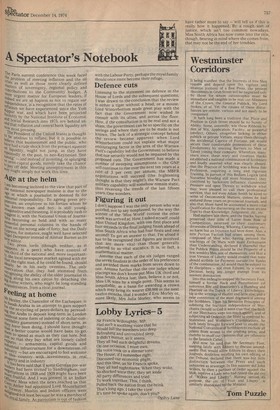A Spectator's Notebook le Paris summit conference this week faced
Problem of meeting inflation and the oil risis as well as those more clearly defined M4tters of sovereignty, regional policy and contributions to the Community budget. A ncire urgent matter for European leaders, if indeed we are so hapless as not to regain our fdePendence, is a recognition that the rates of lation we have experienced since the Yam Ppur war, and which have been projected 43olishly by the National Institute of Economic 4,nd Social Research into 1975, are behindus, ortod that reflation and central bank liquidity are w most pressing. t he President of the United States is thought bee,be anxious to, reflate, but it is possible to k 'ieve that businessmen and the public, who 0'h ad a rude shock from the present squeeze re liquidity, might not jump, as they have tPeatedly in the past, to neo-Keynesian 'fine lOg —and instead of investing, or splurging t: semi-capital goods, merely take the chance w Pay off debt. Meeting unemployment in this aY might simply not work this time.
Age at the helm
becoming inclined to the view that part of "le national newspaper malaise is • due to the 4g,e at which a journalist is deemed fit for rjIt0rialriresponsibility. To ageing press pro has' employeeetors an in his forties whom he known manand boy, is still young, ginative and thrusting. It is probably rash to i'.aggest it with the National Union of Journa ,,,Ist§ becoming so bold and with so many 4;"\verful personal columns in the hands of ose on the wrong side of forty, but the Daily 1‘,-ictiress, for instance, might well have selected igel Dempster instead of Alistair Burnet as its eW editor. lko press lords (though neither, as it oal)Peris, is a peer) who have control of e-third of the national and, more importantlocal newspaper market agreed with me irinat the right man, if he could be found, should reeallY be in his early twenties. The only trvation that they had stemmed from 1;4.-r ognising the ability of the older journalist to ing along his own circus by detaching the 4cgliame writers, who might be long-standing quaintances, from a rival journal.
keeling at home
, ,
Q ea 1 eY, the Chancellor of the Exchequer, is 'audi Arabia in an attempt to gain support iur the re-cycling of petro-dollars by persuadng the Arabs to deposit long-term in London 1„ 'flout some form of indexing or dollar-conti'irtibility guarantee) instead of short-term, as the, have been doing. I should have thought IC' a better course would have been to get jZill to spend as much as they can here. Not so that they buy what are loosely called irity°rts — armaments, capital goods and in..,ustrial infrastructure for a downstream oil ingottry — but are encouraged to feel welcome
Pro tuts" country with investments in real Pe ,..rtY and in industry.
INri"as been said that if some ,German pre-war he:e,rs had been invited to Sandringham, our rheiiations in 1938 and 1939 might have been oft.N fruitful. And I was present in an Indian C1,,,Icers' Mess when the news reached us that Attlee had appointed Lord Mountbatten leli iceroy, Muslim and Indian officers were ghted not least because he was a member of e r°Yal family. As patriotism is out.9‘f,fashion
with the Labour Party, perhaps the royal family should once more become their refuge.
Defence cuts
Listening to the statement on defence in the House of Lords and the subsequent questions, I was drawn to the conclusion that the review is either a tiger without a head, or a mouse. Lord Winterbottom made great play with the fact that the Government now wished to consult with its allies, and across the floor. How, if the consultation is to be real and not a sham, the government can be so specific on the savings and where they are to be made is not known. The lack of a strategic concept behind the review became apparent when Lord Winterbottom could not explain what major encouraging factor in the area of the Warsaw Pact's capability led the Government to believe that our security would not be impaired by the Proposed cuts. The Government has made a number of sweeping assumptions —the GNP
u
will contine to rise over the next ten years at a rate of 3 per cent per annum, the MBFR negotiations will succeed (the frightening thought is that they might!), the Warsaw Pact military capability will somehow remain static, thus reversing the trends of the last fifteen years. One wonders.
Figuring it out
I don't Suppose I was the only person who was puzzled, not to say nonplussed, by the way the winner of the 'Miss World' contest the other week was arrived at. How, I asked myself, could Miss United Kingdom, with one first place and four seconds in the final judging finish ahead of Miss South Africa who had four firsts and one second? To get an answer to that, I'm afraid it has to be recognised that figures are involved that are more vital than those generally IT rme mathematical to as vital statistics. It is, in fact, a hematical matter. Assume that each of the six judges ranged the seven finalists in the order of his preference and awarded them marks from seven down to one. Assume further that the one judge whose placings we don't know put Miss UK third and Miss South Africa last; then, believe it or not, Miss UK wins by a single point. This seems so inequitable, as a basis for awarding a crown which may bring its wearer 00,000 in the next twelvemonths, that 1 wonder if Eric Morley or, more likely, Mrs Julia Morley, who seems to




















 Previous page
Previous page